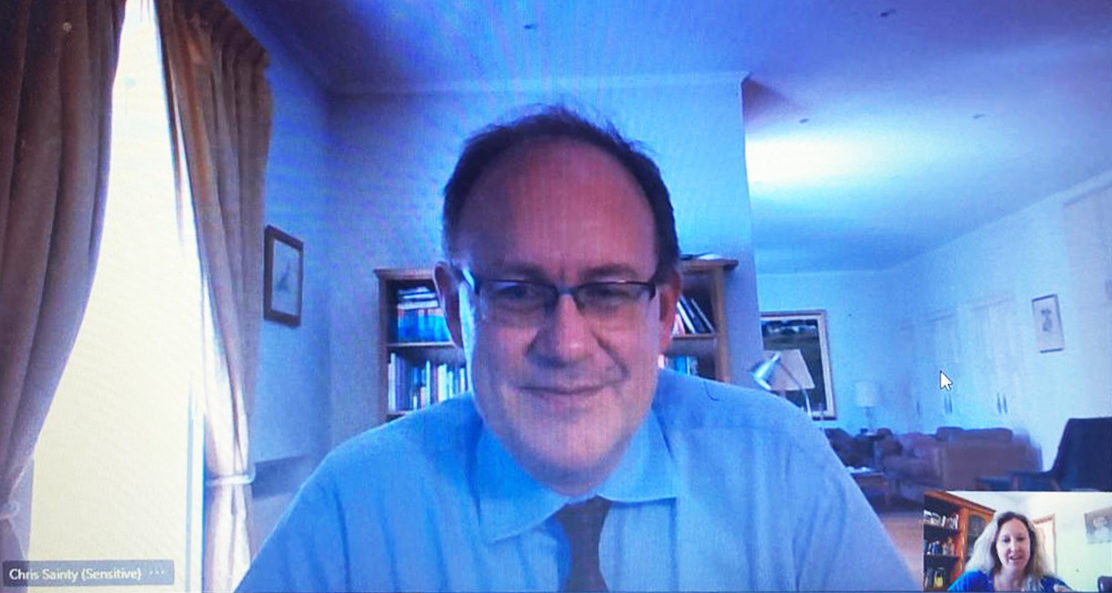Sophie Sadler’s interview with the British Ambassador in Portugal Chris Sainty
On Friday 19 March Portugal was taken off the UK´s red list. What in reality does this mean for us?
It’s good news. From Friday morning Portugal will no longer be subject to the red list restrictions for travel to the UK. The ban on direct flights from the UK to Portugal will be lifted and people will no longer be required to self-isolate under the government’s hotel quarantine scheme.
That does not mean that all restrictions have been lifted. There are still a lot of things that people need to do if they are travelling from Portugal to the UK. They will need to complete a passenger locator form. They will need to provide a negative COVID test before they travel and when they arrive in the UK they will be required to self-isolate for 10 days and to be tested on day two and day eight. All these details are clearly set out in the UK government´s travel advice pages.
It is a big step in the right direction and a reflection of the greatly improved COVID situation here in Portugal compared to where we were a couple of months ago.
Was it the correct decision by the UK for Portugal to be on the red list?
The reason Portugal was put on that list in the first place is that British ministers are determined to minimise the risk to the British vaccination programme which, as you know, has been rolling out fast and successfully. One of the biggest risks is importing COVID-19 variants, which might be more resistant to the vaccines that we are using.
Back in January, there were still direct flights coming into Portugal from Brazil with limited border restrictions in place.
For this reason, British ministers felt it was a risk they were not prepared to take. So flights were stopped in January.
Now Portugal has stopped direct flights from Brazil and increased its capacity to conduct surveillance of variants of concern, the British government has more confidence in data from Portugal and that was enough to tip the balance back.
There is still a ban by the Portuguese government on direct flights from the UK to Portugal and whether that gets lifted is a matter for the Portuguese government, which will form its own judgement on the pandemic risk in Portugal.
The purpose of the red list was to reduce travel from Portugal to the UK, but it has never been illegal for UK nationals or residents to travel back to the UK.
Was there a diplomatic breakdown last summer between the two countries in respect of Portugal being left off the safe list for such a large part of the holiday season?
There was a lot of speculation about the UK government having questionable motives in respect to their decisions on travel restrictions. None of that was true.
There was only one set of motives behind the government’s decisions and that was protecting public health in the UK. Of course, every country has to protect its population. British ministers have shown they are ready to make very difficult and often unpopular decisions with that in mind.
I was not advising ministers on this: that was rightly for British epidemiologists and the department of health. But in the lead up to the summer, Portugal had higher rates of infection than the rest of Europe. We managed to make the case for the Portuguese islands to be given certain exemptions. But as far as the mainland goes, there was a long period when ministers didn´t judge it was possible to put Portugal on the safe list as mainland Portugal’s infection rates were too high.
Entirely understandably, the Portuguese government was not pleased last summer as, of course, it had serious economic consequences. But the UK’s motivation was always the protection of public health and ministers won´t be pressured into compromising on that.
The Embassy and I have an important role in making sure all the information and data is available to the experts in the UK who provide the analysis and give advice to ministers. We made sure the information was flowing and the right conversations were happening between the two governments.
UK residents who own property here or spend the winters here are disappointed that there is now a 90 day limit to the duration of their stay in Portugal. Is this something that is set in stone or will there be some flexibility?
When the UK was a member of the EU, UK citizens enjoyed the right of free movement throughout the EU without restrictions. The UK is now what the EU calls a ´third country´ and that right to free movement no longer exists. British visitors are bound by EU Schengen law, which says that you can spend a maximum of 90 in 180 days and that law does not distinguish between property owners and more casual visitors. If people want to spend longer than 90 in 180 days here, they will have to seek permission from the Portuguese authorities and apply for an appropriate visa. SEF and the Portuguese consulates in the UK can give more advice on that.
I am not aware that the Portuguese government are looking to give property owners an exemption and this was always an inevitable consequence of leaving the EU. The 90-day visa-free arrangement is already more flexible than some ´third countries´ who have to secure a visa just to enter the country, but the UK was able to secure this visa-free arrangement.
What about people who arrived and lived here prior to the cut-off date of 31 December 2020 and for whatever reason were not able to get a residence permit from their local câmara? What rights do they now have?
People who can demonstrate they were living in Portugal before the cut-off date are covered by the Withdrawal Agreement. They have the right to residence here in Portugal. SEF has indeed said that people will be able to register for residency for the foreseeable future . But it is also true that they haven´t yet announced or set up the process for doing that. We know that for these people it is an important issue and we are talking to SEF and urging them to clarify what people in this category need to do. When there is clarity, we will update information on our website and other channels to help people understand what needs to be done.
I understand that people may be frustrated and want clarity but they shouldn´t be concerned because if they were legally living in Portugal before 31 December, they are entitled to full residency rights as set out under the Withdrawal Agreement – even if they don´t yet have the piece of paper. I hope that this is reassuring.
What about people who were not resident prior to December 31st?
They no longer have the right to free movement in the EU and so must apply for residency as a ´third country´ national and that is a different process. They will need to research the options with SEF and the Portuguese Consulates in the UK and apply to them. It is a different process but certainly not impossible.
Why is there a problem with deliveries to and from the UK and can this be overcome?
I speak as someone who has first-hand experience of these unwelcome changes! Packages being withheld and customs charges, so I have a lot of sympathy for those that find themselves in the same situation. The UK left the EU customs union on 1 January, at the end of the transition period, which means there is now a customs border between Britain and the EU that wasn´t there before. So all goods travelling across the border, including the packages we send, are now subject to customs checks.
Although under the terms of the trade agreement negotiated with the EU in December, there won´t always be tariffs payable, there will be various administrative and handling costs associated with exporting goods from the UK and importing them into the EU. Like you, I have been hearing stories of people being charged a lot in some cases. So we are talking to the Portuguese customs authorities about this and trying to get a better understanding of how importing goods between our countries works because of course, this is all new.
This is the sort of thing that could have a negative impact on trading relations, so there is an interest on both sides to try to ensure that goods can travel as smoothly as possible between the two countries and to try to ensure that barriers and charges are as low as possible. That is the conversation we are having with the Portuguese customs authorities. But the border is now there, we can´t wish it away, and none of these charges are under the UK government´s control.
Can British nationals resident in Portugal return to the UK for COVID Vaccines?
The UK vaccination programme is not designed to cover British citizens living overseas. So the expectation is that Brits living overseas should access the vaccination programme in the country they live in.
What re-assurances can you give to vulnerable groups waiting for their vaccination in Portugal?
The vaccine programme in the UK has been remarkably successful, but Portugal is also making good progress . According to the latest figures I have seen they were above the European average in the number of doses they had administered per thousand of the population. Over 1 million first doses have now been administered. Some of the vaccine supply shortages are now being overcome. Of course it is frustrating having to wait but I don´t think people should be unduly concerned about the speed with which the vaccination programme is being rolled out in Portugal.
What we understand from the Portuguese authorities is that people should ensure that their SNS user number and registration with their local health centre are up to date and they will be contacted and invited to come for a vaccine at the appropriate time. If they normally visit a private doctor they should ask that doctor to inform their Centro de Saude, of any health issues, they may have.
People living here who have not yet received their residency card can be vaccinated and have the same rights but it is not yet 100% clear what the process is. That is another question we are discussing with the Portuguese health authorities and as soon as we have a clear answer, we will publish it. We are discussing all this with the Portuguese government and will make advice and information available when we have it.
Do you think a vaccine passport should be introduced?
It is not for me to offer a view on what entry requirements the Portuguese government should put in place. On the general issue of vaccine passports, it is often more complex than it seems and there are many questions to which we haven´t developed clear answers. Who should issue vaccine passports? Who would regulate that process? What length of validity would there be? What international co-operation would be needed for all countries to recognise them?
I understand that people are attracted to this idea, particularly in the context of international travel and to help the tourist and travel sector. Maybe some kind of vaccine passport will be part of the solution and I understand that the EU is on the verge of making an announcement. It is certainly being looked at very closely in London. For the reasons set out above, the UK government are being very cautious and haven´t committed to a particular model. Clearly it will also be interesting to see what countries further ahead in their vaccine programmes, like the UK and Israel, will do.
In terms of Algarve tourism can we be optimistic about this summer?
Lifting of red list restrictions is a step on the right track but there are still lots of restrictions to be lifted as mentioned previously, before people can start planning holidays to Portugal again. We are really aware of the impact of travel restrictions on tourism and hospitality, but saving lives will always come first and that will always be the UK government´s priority.
The Portuguese government will make its own analysis on when to open up to UK visitors, but of course, if the conditions are right and if they consider the risks can be managed safely, it would be excellent news to open up holiday destinations as there are so many struggling businesses in Portugal and elsewhere. But COVID is not predictable and lifting restrictions is a big decision for governments, with life or death consequences if you get it wrong.
Decisions are made on the balance of scientific evidence and certainly will not be influenced by pressure from the media or social media. At the Embassy we take our job very seriously in making sure the scientists in the UK have access to the mountains of data from Portugal. When opening up can be done safely, I am sure it will be done.
How challenging has the last couple of years been dealing with Brexit and COVID?
You are right that these two challenging issues have taken up a lot of my time as ambassador over the last couple of years, as well as my team’s time and energy. But happily, it´s not all about COVID and Brexit. There is a lot of other stuff going on in the world which we can also engage with.
For example, yesterday, the British government launched its new integrated review of foreign policy. It’s a big and important piece of work intended to shape the UK´s role on the international stage. That is a document that we can use to frame our activity in a country like Portugal and work out what our big strategic priorities look like here.
There is a very exciting global agenda, from which I would single out climate change. The UK is going to be chairing the United Nations Climate Change Conference (COP26) in Glasgow in November, which is a really big moment for the world. A moment when the international community needs to step up and make some big commitments to meet our Paris goals on climate change. This is really what we should be spending our time worrying about as it is by far the biggest challenge we face in our generation and our children´s generation. If we don´t get it right then everything else pales into insignificance. It’s an exciting challenge to be part of.
The UK and Portugal are very like-minded on this we have made similar commitments to eliminating carbon emissions and we share other important common goals like protecting the oceans and marine environment.
Have the services the British Embassy in Lisbon offer, been adversely affected by Brexit?
No, not at all. The philosophy that underpins our consular services, the part of the Embassy that offers assistance to British citizens, has always been focused on assisting vulnerable people, and that hasn´t changed at all. Obviously some of our effort and energy over the last couple of years has been focused on advising people about residency, driving licenses etc. Hopefully, as systems settle down in the not too distant future, that workload will decrease. But we will always prioritise assistance to vulnerable UK citizens. I don´t think any of that changes having left the EU.
Do you read Tomorrow magazine?
I can’t promise I read it cover to cover every month, but I certainly see it every month, and it is great!
For more information on:
The issuing of Portuguese driving Licenses
How to exchange your driving licence online (Video)
View or share your driving licence information
To exchange your residency document for a biometric card visit SEF´s Brexit portal













